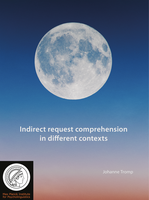What do you actually mean?

A waiter in a restaurant can easily interpret the sentence “Our bottle is empty” as a request to get a new bottle rather than a literal comment on the state of the bottle. During her PhD, Johanne Tromp used pupillometry (measuring pupil size) and electroencephalography (measuring brain activity) to investigate how we identify and interpret such indirect messages. Since the context in which indirect sentences are produced helps with understanding them, she also used Virtual Reality (VR), namely a virtual restaurant, to mimic this context in her last experiments.
The results of the studies show that people in general find it more difficult to process sentences with an indirect message than literal sentences with no indirect messages. However, this effect is modulated by the pragmatic abilities of the person. In addition, it was found that people use different kinds of information from the context to comprehend indirect sentences, for example their relation to the speaker (think of a waiter and a restaurant guest). On a methodological level, the results show that it is feasible to combine VR with brain measurements to investigate language processing in a more realistic, dynamic environment.
More information
- Johanne Tromp will defend her thesis on Monday 18 June 208 at 12:30am in the Aula of the Radboud University.
- For more information: trompjohanne [at] gmail.com (trompjohanne[at]gmail[dot]com)
Share this page